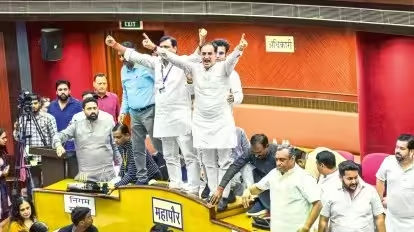Stay updated on the Delhi MCD Panel Election 2024! Discover the high drama and critical voting showdown that will shape the city’s future. Don’t miss out!

Delhi MCD Standing Committee Election: High Drama, Controversy, and Political Tensions
The Delhi Municipal Corporation (MCD) Standing Committee election has become a focal point of intense political drama and controversy. Delhi Lieutenant Governor VK Saxena recently ordered the municipal commissioner to conduct the election for the final vacant seat on Friday, following a series of delays and disputes. The ongoing conflict between the Bharatiya Janata Party (BJP) and the Aam Aadmi Party (AAP) has escalated, reflecting deeper political struggles within the city’s administration. For a detailed background on the role and importance of the MCD Standing Committee, you can refer to the official MCD website (dofollow).
Timeline of Events: Postponements and Conflicts
The election was initially scheduled for Thursday, but Mayor Shelly Oberoi, representing AAP, adjourned it until October 5. This decision came after a heated confrontation over security measures, including a directive to ban mobile phones and electronic gadgets in the chamber during voting. The restriction was met with resistance, especially from AAP councillors, who felt that it infringed on their dignity and democratic rights. You can read more about the specific rules governing MCD elections here (dofollow).
The decision to adjourn the election prompted the LG to issue a new order, directing that the election be conducted on September 27 at 1:00 pm. Jitender Yadav, Additional Commissioner, was appointed as the Returning Officer, with instructions to ensure that the election process be videographed and conducted without any electronic devices in the voting area to maintain the secrecy of the ballot.
The Political Standoff: BJP vs. AAP
The conflict between the BJP and AAP over the Standing Committee seat has been intense. The BJP, currently holding nine seats, is vying for the vacant position to secure a stronger majority, while AAP, with eight seats, is keen to prevent BJP from gaining control. The resignation of BJP councillor Kamaljeet Sehrawat from Dwarka-B, who was elected as a Member of Parliament from West Delhi, vacated the 18th seat, making this election crucial for both parties.
The friction escalated when AAP councillors protested the decision to ban mobile phones during the voting process, accusing the BJP and MCD authorities of violating their rights. The situation reached a boiling point when AAP members staged a sit-in protest in the MCD lobby, disrupting the proceedings for several hours. Mayor Shelly Oberoi argued that the ban on mobile phones and frisking at the entrance violated the dignity of elected members and was an unprecedented move in the history of the MCD. For an in-depth analysis of the political scenario in Delhi, visit Delhi Government Portal (dofollow).
LG’s Intervention and Legal Implications
The Lieutenant Governor’s intervention has further complicated the situation. In his order, he emphasized that the non-constitution of the Standing Committee for the past 21 months has hindered crucial decision-making within the MCD. He argued that it is in the larger public interest to conduct the election without further delay to restore the democratic functioning of the municipal body.
Mayor Oberoi, however, maintained that holding the election before October 5 would be “illegal and unconstitutional.” Her stance has drawn criticism from the BJP, which accused AAP of stalling the election due to fear of losing control over the committee. BJP Delhi Chief Virendra Sachdeva even threatened to file a contempt petition against the Mayor for defying the Supreme Court’s directions regarding the conduct of the election. You can read more about the legal implications of such political standoffs on the Supreme Court of India’s website (dofollow).
The High-Drama Election Day
On the day of the election, tensions were palpable as councillors and party members gathered for the vote. Delhi police set up multiple security checkpoints at the entrance to ensure compliance with the ban on electronic devices. While BJP councillors complied with the rules, AAP members continued their protest, arguing that such measures were an affront to their status as elected representatives.
The standoff, which began around 2:00 pm, persisted until late in the evening, when the MCD finally decided to postpone the election once again. The delay led to a chorus of slogans from BJP members, who demanded that the election be held immediately, accusing the AAP of avoiding the vote due to internal dissent and fear of losing support.
What’s Next for the MCD?
The unresolved conflict over the Standing Committee election has left Delhi’s civic administration in a state of limbo. The inability to constitute the committee has impeded decision-making on critical municipal issues such as waste management, public health, and infrastructure development. The prolonged standoff also reflects broader political battles between the BJP and AAP, with each party seeking to assert its dominance in Delhi’s governance.
As the new election date approaches, both parties are likely to intensify their efforts to secure the vacant seat. For the BJP, maintaining its current majority is crucial to pushing through its agenda within the MCD. For AAP, gaining control of the committee is essential to counter BJP’s influence and implement its policies effectively.
Conclusion
The Delhi MCD Standing Committee election has turned into a high-stakes political showdown, marked by allegations, protests, and legal challenges. The outcome of this election will not only shape the composition of the MCD but also have a significant impact on the city’s administration and governance. As both parties prepare for the next round, residents and political observers alike will be closely watching how this drama unfolds and what it means for the future of Delhi.




